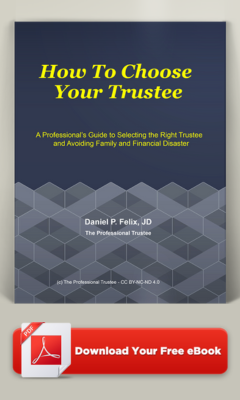How to replace the trustee who isn’t serving the best interests of the family
During the course of trust administration, an unproductive relationship may develop between the trustee and the beneficiary. This fact is not surprising given the sad current reality: few trustees— including individual and corporate professional trustees— study how to administer successfully to fulfill the wishes of the grantor to benefit the beneficiary.
I’ve witnessed too many of these situations where the trustee chooses to ignore or even trample on wholesome options. Our beneficiary bill of rights offers one statement of the truths of appropriate administration, truths which should be self-evident.
When confronted with the broken bonds of his relationship with the beneficiary, too often the trustee refuses to simply step aside.
Often what motivates a trustee to overstay his welcome isn’t clear. It could be he’s seduced by righteousness or by his wrong-headed notions of what the grantor would have wanted. It could be he’s in it for the money or for the exercise of power. It could be some combination of all those. And it could be due to something entirely different. While knowing the exact reason could be useful and perhaps comforting, it is ultimately irrelevant to a family’s pursuit of freedom from this exquisite form of tyranny.
And so, the question then becomes: if and how to replace the trustee.
Of course, as in 1776, a good team and counsel can make all the difference.
Lawyers appropriately start this campaign with waging war on the battlefield of the legal system through the trust document and the law. Some consideration, however, first should be given to pursuing a simpler solution: plainly and respectfully asking. I obtained my first assignment as trustee some 30 years ago after the beneficiary simply requested my predecessor resign. That trustee did so, and so my profession began.
If the request doesn’t work, then consider the legal battlefield.
Where the trust document provides for a power of appointment to a third party— such as an elder or a professional acting as trust protector— the family can seek redress from them. Should the tyrant trustee resist, courts should enforce this peaceful transfer of power. Sadly, too many trusts haven’t been updated to incorporate this modern, healthy safeguard.
The next option is to assess whether the trustee’s bad behavior constitutes a legal violation. The trustee’s misappropriating the trust assets for his own benefit is the highest treason against his sacred duty to manifest the vision of the grantor for the benefit of the beneficiaries. Courts are generally good in alleviating this perversion, including relieving the trustee from his job.
Some families expect too much from a judge. Courts generally use a narrow definition of a legal violation, and can’t consider a trustee’s betrayals of his moral, mentoring, empowering and other inescapable roles, unless they constitute violations of his legal duties as well. Further, without evidence of actionable financial or legal wrongdoing, a judge may well add the insult of having the family’s trust pay for the trustee’s legal fees.
Off the legal battlefield, the campaign to remove the trustee can be waged through a strategy that deploys tactical incentives and disincentives. As in court, victory, if it comes, will do so in its own time and rely on creativity, persistence and patience— and also carry its own risks and costs, personal as well as financial. Unlike court, the approach is more bespoke, depending on the specific personalities and circumstances at hand.
Positive incentives can include appeals to the better angel of the trustee, such as offering visions of better administration available from a more suitable trustee.
The other hand contains the approach summarized by the ancient truism: the squeaky wheel receives the grease. Through application of law-abiding tactics, the trustee is lead to conclude that it’s in his self-interest to resign.
Whatever the campaign, the beneficiary does well to consider his internal and personal game. This is to own his personal journey and growth, and also to demonstrate due respect for the opinion of others. After all, we should act as if God and the world are watching.
© 2017 – 2023 Daniel P. Felix, all rights reserved
American flag photo by Tim Mossholder on Unsplash

